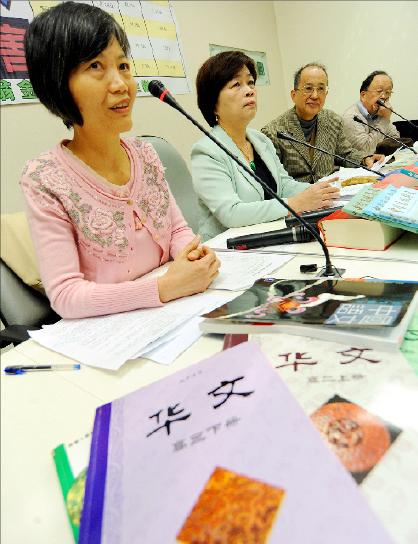A curriculum for high school students that has more emphasis on classical Chinese texts is not a good thing for either students or schools, Democratic Progressive Party Legislator Wong Chin-chu (翁金珠) said yesterday.
Wong, accompanied by Chang Jung Christian University’s Graduate Institute for Taiwan Studies visiting professor Chuang Wan-shou (莊萬壽), National Association of Parents’ Organizations chairman Hsieh Kuo-ching (謝國清) and Ministry of Education Curriculum Commission member Lin Lih-yun (林麗雲), criticized the education ministry’s recent decision to make the study of the Four Books — Great Learning (大學), Doctrine of the Mean (中庸), Analects of Confucius (論語) and Mencius (孟子), which are ancient Confucian classics written before 300BC — mandatory for high school students in an attempt to restore morality and prevent bullying.
Wong said that if the students spend so much time memorizing classical Chinese texts — which are written differently from the modern Chinese — they would not have time to study modern and world literature.

Photo: Lo Pei-der, Taipei Times
She went on to say that since President Ma Ying-jeou (馬英九) took office, classical Chinese texts have come to comprise 65 percent of the books read by high school students, compared with 45 percent before he was in office. Now that the government is further increasing the emphasis on Chinese classics by making the study of the Four Books mandatory, Wong said that it would be too much for students to handle.
Lin said the ministry increased the emphasis on Chinese classics in a curriculum submitted in September last year, after several members on the Curriculum Committee had been changed. However, the committee has now overruled the curriculum established in September and made the study of the Four Books mandatory.
“What is the basis for the change?” Lin asked.
Chuang said it doesn’t make sense to make the Four Books mandatory for high school students, considering that their study isn’t even mandatory for students at public universities.
He said that the Four Books were used as major textbooks in ancient times and contain no spirit of modernity. Therefore, he said it’s impossible to solve the problem of bullying at school by asking students to study the books.
Hsieh said that Taiwanese high school students attend school for 35 hours a week, which is much more than the 20 to 25 hour average for Western countries.
With such a harsh curriculum, Hsieh said, it would become difficult for each school to develop its own distinguishing feature.
In response, the ministry yesterday said it “humbly accepts all suggestions and criticisms and will forward the opinions to the Curriculum Committee for discussion.”

A magnitude 6.4 earthquake struck off the coast of Hualien County in eastern Taiwan at 7pm yesterday, the Central Weather Administration (CWA) said. The epicenter of the temblor was at sea, about 69.9km south of Hualien County Hall, at a depth of 30.9km, it said. There were no immediate reports of damage resulting from the quake. The earthquake’s intensity, which gauges the actual effect of a temblor, was highest in Taitung County’s Changbin Township (長濱), where it measured 5 on Taiwan’s seven-tier intensity scale. The quake also measured an intensity of 4 in Hualien, Nantou, Chiayi, Yunlin, Changhua and Miaoli counties, as well as

Credit departments of farmers’ and fishers’ associations blocked a total of more than NT$180 million (US$6.01 million) from being lost to scams last year, National Police Agency (NPA) data showed. The Agricultural Finance Agency (AFA) said last week that staff of farmers’ and fishers’ associations’ credit departments are required to implement fraud prevention measures when they serve clients at the counter. They would ask clients about personal financial management activities whenever they suspect there might be a fraud situation, and would immediately report the incident to local authorities, which would send police officers to the site to help, it said. NPA data showed

ENERGY RESILIENCE: Although Alaska is open for investments, Taiwan is sourcing its gas from the Middle East, and the sea routes carry risks, Ho Cheng-hui said US government officials’ high-profile reception of a Taiwanese representative at the Alaska Sustainable Energy Conference indicated the emergence of an Indo-Pacific energy resilience alliance, an academic said. Presidential Office Secretary-General Pan Men-an (潘孟安) attended the conference in Alaska on Thursday last week at the invitation of the US government. Pan visited oil and gas facilities with senior US officials, including US Secretary of the Interior Doug Burgum, US Secretary of Energy Chris Wright, Alaska Governor Mike Dunleavy and US Senator Daniel Sullivan. Pan attending the conference on behalf of President William Lai (賴清德) shows a significant elevation in diplomatic representation,

The Taipei City Reserve Command yesterday initiated its first-ever 14-day recall of some of the city’s civilian service reservists, who are to undergo additional training on top of refresher courses. The command said that it rented sites in Neihu District (內湖), including the Taipei Tennis Center, for the duration of the camp to optimize tactical positioning and accommodate the size of the battalion of reservists. A battalion is made up of four companies of more than 200 reservists each, it said. Aside from shooting drills at a range in New Taipei City’s Linkou District (林口), the remainder of the training would be at